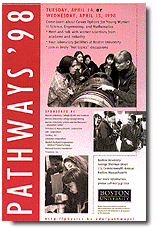|

1. Wildlife
One concern that's been raised about global
warming is the possible effect on wildlife and natural
ecosystems. Which arguments do you find most
convincing?
Life survived the ice ages, it will survive a slightly warmed climate.
As the world warms, species will simply migrate to more suitable locations.
Even if a few species don't survive the change, extinction is a part
of the natural order; the most fit species are those that can adapt
to new conditions. Trying to reduce pollution drastically is just
too expensive; lifting people out of poverty is more important than
saving a few species of fish. Besides, if we try to cool the planet
down, we might go too far and send the world into another ice age.
If the climate changes too quickly, plants and animals may not have
time to adapt and may simply die off. Species can't necessarily migrate
if the routes are cut off by cities, highways and farmland. If a few
key species go extinct, a whole ecosystem can fall apart leading to
disaster. We can't afford to stop global warming: we rely on our natural
ecosystems to provide us with clean water, air, and food.
2. Role Play
How do ideas like conserving energy and
reducing greenhouse gas emissions look from the viewpoint
of people from different parts of the world? Try
having some of your group pretend to be the board of
directors of an American company; have the others take on
the role of farmers of a small village in Malaysia. Here
are some ideas to get you started:
AMERICAN BUSINESS EXECUTIVES MIGHT SAY: Countries that are just starting
to industrialize should use clean, nonpolluting technology from the
start. The rare ecosystems like rain forests are in the non-industrialized
countries. If the ocean rises due to global warming, poor coastal
countries like Malaysia will have the most to lose. The USA can't
just stop polluting all at once, or our economy will fall apart.
FARMERS IN MALAYSIA MIGHT SAY: Countries like the USA are responsible
for most of the pollution and they should clean up their own mess.
We deserve the chance to modernize our countries and give our people
a better life. Nonpolluting technology is much more expensive: if
we have to use this, our country will stay poor, without good schools
or medical facilities. If the rich countries want us to use nonpolluting
technology, they must pay for it themselves.
3. Gasoline Tax
Emissions from burning gasoline in automobiles are a major
contributor to global warming, with potentially harmful effects on human
help and the environment. Yet in the United States, gasoline is sold
for far less than in many other countries ($1/gallon in US: $5/gallon
in Europe), perhaps not reflecting the 'true cost' of using gasoline.
Recently a high tax was levied on cigarettes, in part because cigarette
smoke has been shown to harm the health of smokers and those who breathe
secondhand smoke. The tax money is to be used for paying the medical
bills of smokers and to educate people about the dangers of smoking.
What do you think - would it make sense to put a
similar high tax on the price of gasoline? In
deciding, you might want to consider how the tax could
affect consumers, industry, and research.
4. The Nuclear Alternative
Using fossil fuels (coal, oil, gas) as an energy source produces
large amounts of greenhouse gases that, in turn, lead to unnatural warming
of our planet and potential damage to ecosystems, agriculture, and water
systems. Perhaps finding an alternative energy source would be wise.
Some people have suggested that using nuclear power would make sense.
The following information may help you think about the issues: Nuclear
plants produce no greenhouse gases. They do produce radioactive waste,
which is dangerous (e.g. it may case mutations in DNA), long-lived,
and difficult to store. Nuclear power has been used on a large scale
already; it is not a small-scale experimental technology like solar
or wind power. Nuclear power plants must be very carefully designed
and maintained to prevent radioactive material from leaking out; some
plants have been operated safely for years, while a few have had minor
accidents. We already have over 100 operating nuclear plants in the
United States, but are not building any new ones at present; the existing
plants will be closed by the year 2020 if they are re-licensed. A
number of countries in Europe and Asia also have nuclear power plants;
some of these countries (Japan, Korea, China) are building or designing
new ones.
What do you think - should the United States pursue
nuclear power to help stop global warming?
5. What can you
do?
We've been talking about global issues. Recall the sayings
"Think globally, act locally" and "A journey of one thousand miles begins
with a single step." What are the most effective things YOU can do
to prevent global climate change? Remember the idea of "a thousand
points of light": many efforts can add up to make a big difference.
(to check your answers see http://www.epa.gov)
|

![]()